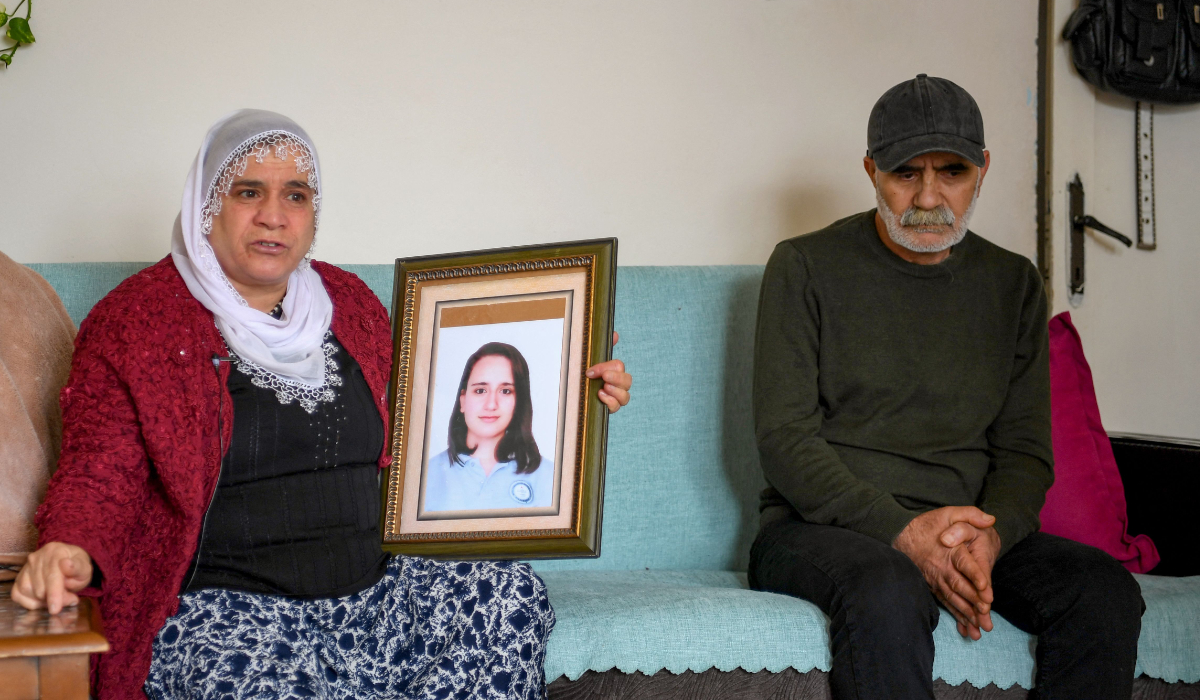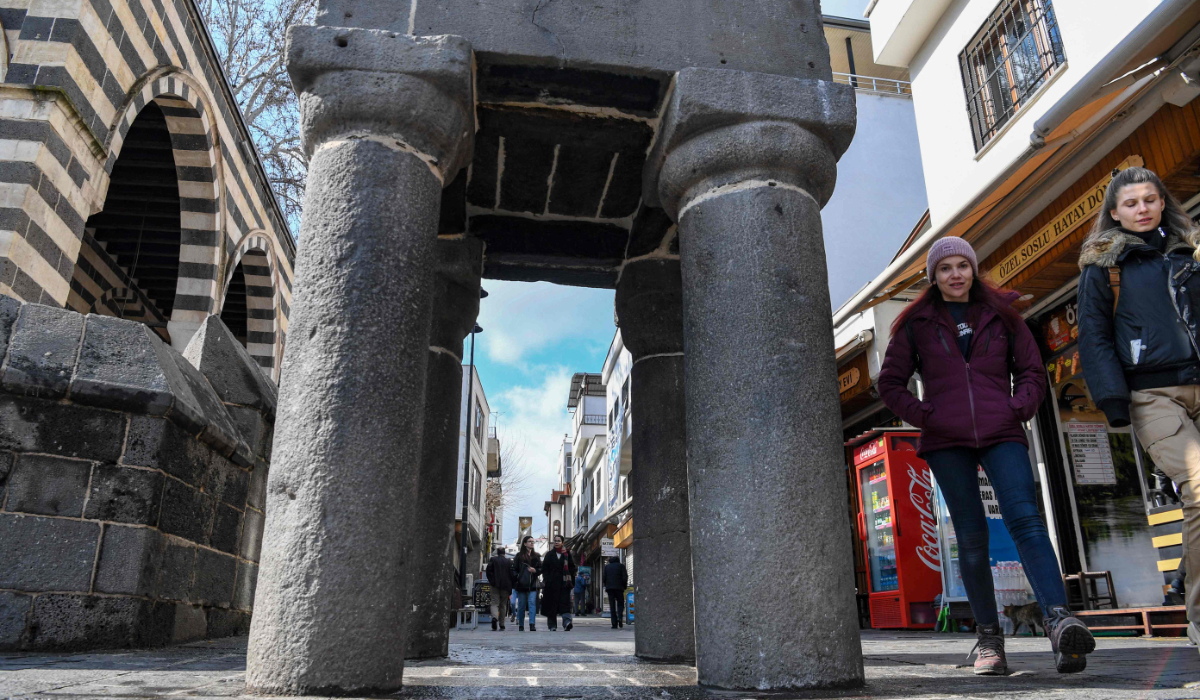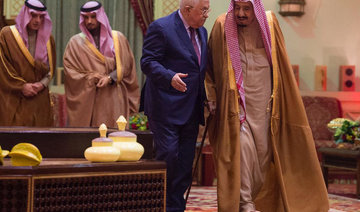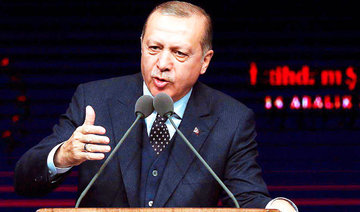AMMAN: Senior Palestinian leaders have welcomed a call for the reconvening of the Palestine Central Council (PCC).
Tayseer Khaled, a member of the PLO’s executive committee and a senior leader of the Democratic Front for the Liberation of Palestine, told Arab News that it was time that the PLO’s top bodies met to assess the current situation.
“The last time that the PCC met was in March 2015 and at that time it was decided to hold a meeting every three months,” he said. Khaled said that a number of decisions made at the last meeting had yet to be carried out. “It was decided to end our connection with the Oslo Accords and the security coordination with Israel but this has not happened.”
Senior Fatah leader Azzam Ahmad said Monday the central council will discuss the declaration of Palestine as a “state under occupation.” Ahmad said that the PCC will convene in the middle of January 2018 in Ramalah.
Tayseer Nasrallah, a member of the Fatah Revolutionary Council and a member of the Palestine National Council, also welcomed the call for the central council, although he also wants the more important Palestine National Council (PNC) to meet as soon as possible.
“We need the PNC to meet now because of the extremely difficult situation we are in and in order to have a high level discussion of our priorities, and to launch a new national liberation strategy that is in sync with our people’s wishes of having an independent state and enacting the right of return,” he said.
Nasrallah, a Fatah leader in Nablus who spent many years in Israeli jails, told Arab News that it was important to reassess relations with the Israeli occupiers and the Americans. “We need a serious review of the entire Oslo process, what is positive and negative about it, so that we can rid ourselves of these shackles and return to proper relations between an occupied people and the occupation. We also need to seriously review our relations with the United states,” Nasrallah said.
Tayseer Khaled also believes that the time has come for the state of Palestine to join all remaining international organizations and agencies.
“This is an opportune time for the PLO to decide on joining some 22 international agencies we have been prevented from joining due to the US conditions,” he said.
He believes that a new strategy for Palestine should include the need to agree on a new multinational mechanism for sponsoring any future talks.
It is still not clear whether Hamas and Islamic Jihad will attend the upcoming Palestine Central Council and where exactly it will take place. A senior source in the Popular Front said it preferred that the meeting would take place outside the Occupied Territories to ensure that all members attended.
However, Nasrallah told Arab News that it was best to hold the meeting in Palestine and those who could not come could join via video conferencing.
Leaders welcome meeting of Palestine Central Council
Leaders welcome meeting of Palestine Central Council

Families yearn for an end to PKK-Turkiye war

- The PKK’s jailed founder Abdullah Ocalan is widely expected to urge followers to lay down their arms in the coming weeks
- The new peace efforts are backed by President Recep Tayyip Erdogan’s government, and families on both sides of the divide want it to succeed
DIYARBAKIR, Turkiye: A mother weeping for a teenaged daughter shot dead by a Turkish sniper and a father mourning a son killed by PKK militants are among countless families hoping that a new peace drive can end Turkiye’s four-decade-old Kurdish conflict.
Both live in the Kurdish-majority southeast, where tens of thousands of lives have been lost in violence between the Turkish state and the outlawed Kurdistan Workers’ Party (PKK).
The new peace efforts are backed by President Recep Tayyip Erdogan’s government, and families on both sides of the divide want it to succeed.

At her home in the city of Diyarbakir, Fahriye Cukur, 63, cannot take her eyes off a picture on the wall of her daughter Rozerin in school uniform. She was killed during clashes between militants and security forces in January 2016.
The collapse of a truce in 2015 sparked a new round of the conflict when many government curfews were imposed, including in the city’s Sur district.
Cukur said her daughter — who was passionate about photography — had gone to Sur during a break in a curfew to collect exam papers from friends. But the authorities suddenly reduced the break from five hours to three and the fighting reignited.
“People were stuck there, including my daughter. She took refuge at the home of an elderly couple, but when she tried to leave, she was shot by a sniper,” her mother told AFP.
The family found out about the death through a news bulletin.
It took five months, several protests and a hunger strike for the grieving parents to get her body back.

Cukur said the authorities had mixed up their teenage daughter with a female PKK fighter, codenamed Roza, who had been hiding in the same district.
They claimed she had been trained in the mountains, but her mother told AFP: “My daughter was never engaged in political activism.
“She loved school, she wanted to become a psychiatrist and help her people,” she added, indicating the “TC” insignia — meaning “republic of Turkiye” — on her school uniform.
The PKK’s jailed founder Abdullah Ocalan is widely expected to urge followers to lay down their arms in the coming weeks.
Many families hope this will end the conflict and spare other families from the pain they live with.
“We can’t forget what happened but we have to hope. I have two more kids: how do I know the same thing won’t happen to them tomorrow?” she said.
Last month, the International Crisis Group said clashes between the militants and Turkish troops were largely confined to northern parts of Iraq and Syria, with violence on Turkish soil at its lowest level since 2015.
“At least we can breathe a bit now,” she said.
“I want the bloodshed to stop. I want a ceasefire. And I am not alone.”
In the nearby province of Mardin, Sehmuz Kaya, a 67-year-old Kurd, recalled how his son Vedat, a police officer, was kidnapped by PKK militants in eastern Turkiye in July 2015.
Vedat Kaya, wearing civilian clothes, was in a car with his brother and four others when militants blocked the road.
“They only kidnapped Vedat,” he told AFP, saying it was months before the family saw a PKK video of him in the Kandil mountains of northern Iraq.
The family tried every possible channel, through the state and the main pro-Kurdish party, to secure his release.
But after six years, they received a devastating call from the authorities, who said he was one of the 13 “Gara martyrs.” The 13, all but one of whom were soldiers or police, had been killed by the PKK in the Gara region of northern Iraq.
“I was devastated,” he said, struggling for words, saying his son had been tortured before his death.
“They have no faith nor conscience. My son was just doing his job,” he said.
Pinned on the ceiling is a huge Turkish flag, and on the walls are photos of Vedat, whose name has been given to a nearby park.
Although he wants peace more than anything, he admitted he has little faith.
“They are not honest,” he snapped, referring to DEM, the main pro-Kurdish party that is relaying messages from Ocalan to the government. He suspects they have ties to the PKK.
“The families of the martyrs are heartbroken. Enough is enough,” he said. “We support the process but we want something real.”
Israel defense minister announces agency for ‘voluntary departure’ of Gazans

- Earlier this month, Katz said he had ordered the army to formulate a plan to allow Palestinians to leave Gaza
JERUSALEM: Israel’s Defense Minister Israel Katz said Monday that a special agency would be established for the “voluntary departure” of Gazans, after Israel expressed commitment to a US proposal to take over the Palestinian territory and expel its residents.
“Defense Minister Israel Katz held a meeting today (Monday) on the voluntary departure of Gaza residents, at the end of which he decided that a directorate for the voluntary departure of Gaza residents would be established within the ministry of defense,” a ministry statement said.
Earlier this month, Katz said he had ordered the army to formulate a plan to allow Palestinians to leave Gaza, adding that he welcomed “Trump’s bold plan, which could allow a large portion of Gaza’s population to relocate to various places around the world.”
An initial plan presented during the meeting on Monday “includes extensive assistance that will allow any Gaza resident who wishes to emigrate voluntarily to a third country to receive a comprehensive package, which includes, among other things, special departure arrangements via sea, air, and land,” the statement added.
Earlier on Monday, Israeli Prime Minister Benjamin Netanyahu said he was “committed to US President Donald Trump’s plan for the creation of a different Gaza,” also promising that after the war, “there will be neither Hamas nor the Palestinian Authority” ruling the territory.
Trump’s repeated proposal for a US “takeover” of Gaza and the resettlement of Palestinians in other countries such as Egypt and Jordan lacks detail but has triggered widespread international outrage.
Hamas’s October 7, 2023 attack on Israel sparked the Gaza Strip’s deadliest war and resulted in the deaths of 1,211 people, mostly civilians, according to an AFP tally of Israeli official figures.
Israel’s retaliatory campaign has killed at least 48,284 people in Gaza, the majority of them civilians, according to figures from the health ministry in the Hamas-run territory that the United Nations considers reliable.
More than 15 months of war destroyed or damaged more than 69 percent of Gaza’s buildings, displaced almost the entire population, and triggered widespread hunger, according to the United Nations.
Zelensky says arrived in Turkiye for talks with Erdogan

KYIV, Ukraine: Ukrainian President Volodymyr Zelensky said Monday he had arrived in Turkiye for talks with Turkish counterpart Recep Tayyip Erdogan on prisoner exchanges and other matters.
“Official visit with the First Lady to Turkiye. Meetings with President Erdogan and First Lady Emine Erdogan,” Zelensky said on his Telegram account.
In first, French minister visits Western Sahara claimed by Morocco

- Algeria has backed the separatist Polisario Front and had already cut diplomatic relations with Rabat in 2021 — the year after Morocco normalized ties with Israel under a deal that awarded it US recognition of its annexation of the Western Sahara
LAAYOUNE: France’s Culture Minister Rachida Dati became on Monday the first French official to make a formal visit to the Western Sahara, a sign of Paris’s recognition of Moroccan sovereignty over the disputed territory.
“This is the first time that a French minister has come to the southern provinces,” Dati told AFP, using Morocco’s name for the area, a former Spanish colony controlled by Rabat but claimed by the Algeria-backed Polisario Front.
Dati described the visit as “historic.”
The United Nations considers Western Sahara a “non-self-governing territory” and has had a peacekeeping mission there since 1991, whose stated aim is to organize a referendum on the territory’s future.
But Rabat has repeatedly rejected any vote in which independence is an option, instead proposing autonomy under Morocco.
Dati, accompanied by Moroccan Culture Minister Mohamed Mehdi Bensaid, launched a French cultural mission in Laayoune, Western Sahara’s main city.
She promised to open the territory’s first French culture center to “benefit children in the region, but also teachers, schools, students and teacher trainers.”
In Dakhla, the Western Sahara’s second city some 530 kilometers (330 miles) south of Laayoune, Dati said she is set to sign a cooperation agreement in the field of cinema and audiovisual art.
France’s stance on Western Sahara has been ambiguous in recent years, often straining ties between Rabat and Paris.
But in July, French President Emmanuel Macron said that Morocco’s autonomy plan was the “only basis” to resolve the Western Sahara dispute.
The turnabout marked by Macron’s statement drew a strong reaction from Algiers.
Algeria has backed the separatist Polisario Front and had already cut diplomatic relations with Rabat in 2021 — the year after Morocco normalized ties with Israel under a deal that awarded it US recognition of its annexation of the Western Sahara.
Macron renewed French support for Morocco’s plan in October, pledging investments and a “strong and exceptional partnership.”
Also in October, the UN Security Council called for parties to “resume negotiations” to reach a “lasting and mutually acceptable solution” for the Western Sahara dispute.
Israel minister says Hamas must leave Gaza, surrender arms

- “If Hamas refuses this ultimatum, Israel will open the gates of hell,” said Smotrich, echoing an expression used by both Trump and Netanyahu
JERUSALEM: Israel’s far-right Finance Minister Bezalel Smotrich said on Monday that Hamas militants must surrender their arms and leave Gaza.
He was speaking ahead of a cabinet meeting to discuss the next phase of the truce between Israel and Hamas Palestinian militants.
Smotrich in a video statement said he “will demand a vote” by ministers on US President Donald Trump’s plan and that Israel must “issue a clear ultimatum to Hamas — immediately release all hostages, leave Gaza for other countries, and lay down your arms.”
“If Hamas refuses this ultimatum, Israel will open the gates of hell,” said Smotrich, echoing an expression used by both Trump and Prime Minister Benjamin Netanyahu.
A strong opponent of stopping the war, he has threatened to quit Netanyahu’s ruling coalition if the war is not resumed after the end of the first stage of the ceasefire.
Trump’s plan lacked detail but has triggered widespread outrage internationally for his call to resettle Palestinians in other countries such as Egypt and Jordan under a US “takeover” of Gaza.
Smotrich said Israel should go for a “complete conquest” of the territory.
According to Israeli media, the security cabinet convened on Monday evening to discuss phase two of the fragile ceasefire which began on January 19.
More than 15 months of war destroyed or damaged more than 69 percent of Gaza’s buildings, displaced almost the entire population, and triggered widespread hunger, according to the United Nations.
“It’s them or us. Either we crush Hamas, or God forbid, Hamas will crush us,” Smotrich said.
“I call on the prime minister to declare that once the war resumes after Phase One, Israel will, from the first day, seize 10 percent of Gaza’s territory, establish full sovereignty there, and immediately apply Israeli law,” he added.
“Furthermore, it must be announced that once combat resumes, all humanitarian aid will be completely halted.”
Smotrich further said that according to a plan currently in preparation “Gaza’s residents will be allowed to leave, but only in one direction — with no possibility of return.”
“The loss of territory is the only heavy price our enemies understand — the only thing that will make them realize we are serious,” Smotrich added.
Since the first phase of the truce began last month, 19 Israeli hostages have been released in exchange for more than 1,100 Palestinian prisoners.
Out of 251 people seized in Hamas’s October 7, 2023 attack on Israel, which sparked the war, 70 remain in Gaza, including 35 the Israeli military says are dead.






















